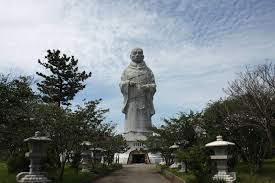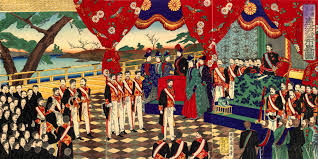
「日本の目覚め(1904)」は、日本有数の英語の達人、著者・岡倉天心が、世界に向けて
真の日本を伝えることに成功した歴史的傑作。現代まで受け継がれている、日本の強み
の原因について解説――バイリンガルで、どうぞ。
“The Awakening of Japan (1904)” is the historical masterpiece in which, Okakura
Tenshin, the author and one of the Japan’s greatest masters of English, successfully
conveyed true Japan to the world. He gives us commentaries on the cause of Japanese
strong point, which has been handed down up till the present――more to come both in
English and in Japanese.
Pessimists declare that the Old Japan is no more. They hold that in her modernization
she has lost her individuality and broken the thread of her historic unity. Eminent
European writers have regarded the present condition of affairs in Japan as transient
and impermanent, a strange freak of orientalism sooner or later doomed to
disintegration.
悲観麺者は「旧日本」は今亡(な)しという。彼らは、日本は現代化のためにその個性
を失い歴史的統一の糸を断ったと考えている。ヨーロッパの著名な作家たちは、日本の
現状を、一時的で永続しない、早晩崩壊の運命にある一種の奇妙な東洋風の変態と
見なしていた。
They image our mutability in the straw sandals which we change at every stage of
a journey; our disregard of all permanence in the wooden houses that are daily swept
away by conflagrations. To them everything Japanese lacks solidity and stability, from
the constantly vibrating land in which we dwell to the philosophy of Buddhism teaching
the evanescence of all things.
彼らは、我々が旅の宿場ごとに取り換える草鞋(わらじ)を見て我々の果敢なさを
想像し、大火によって日々に焼き払われる木造家屋を見ては、我々はすべて永久性を
軽視していると想っている。彼らから見れば日本の物は、われらの住んでいる絶えず
震動する国土から有為転変を教える仏教の哲理に至るまで、ことごとく堅牢安定を
欠いているのである。
It is true that the imperative needs of sudden transformation from the old to the new life
have swept away many landmarks of Old Japan; yet in spite of changes, we have still
been able to remain true to our former ideals; though our sandals be changed, our
journey continues; though our houses be burnt, our cities remain; and the earthquake but
shows the virility of the mighty fish that upholds our island empire.(Japanese folk-lore
teaches that earthquakes are caused by the movement of a huge fish which bears the
islands of Japan upon its back).
もっとも、旧生活から新生活へ急激に変化するためのやむを得ざる必要が旧日本の陸標
を多く一掃してしまったが、しかし、変化は起ったにもかかわらず、依然として昔の
理想を守ることができた。わが草鞋は変わってもわが旅は続いている。わが家は焼失
してもわが都市は現存している。地震はただわが帝国を支えている大魚の気力を示す
のみである(日本の俗説によると、地震は日本を背に支えている大魚の運動によって
起るという)。
It should be remembered that in Eastern philosophy the poetry of things is more real and
vital than mere facts and events. Buddhism, which taught the transitory nature of the
mundane, never for a moment ceased to teach the immutability of the soul. Since the
earliest dawn of history our national patriotism and devotion to the Mikado show
a consistent tenacity of ancient ideals, while the fact that we have preserved the arts and
customs of ancient China and India long after they have become lost in the lands of their
birth is sufficient testimony to our reverence for traditions.
東洋哲学においては、詩趣は単なる事実や事件よりも実在的で根本的であることを記憶
しなければならない。現世の無常を教えた仏教も、霊魂の不滅を説くことは決して苟且
(こうしょ)にも止めなかった。歴史の曙光を見て以来、わが国民の愛国心と御門に
尽す忠義は、古(いにしえ)の理想を終始一貫堅持したことを示している。また一方、
古代支那およびインドの芸術風俗がその発生した国々で失われてしまって久しい後
までも我々がこれを保存してきた事実は、我々が伝統を尊ぶ十分な証拠である。
Our conservatism is well typified by the Shinto temple of Ise, where the Sun-goddess,
founder of our imperial line, is forever worshiped. That holiest shrine of our ancestrism
remains today as perfect in its pristine beauty as it was twenty centuries ago, being
rebuilt every twenty years on an alternate site in its exact original form.
わが保守主義は、皇祖天照大神が永遠に崇拝せられている伊勢神宮によって立派に例示
されている。わが家族制度の最も神聖なかの大廟は、20年ごとに交互に同じ位置に全く
原型のままに改築せられるので、今日においても2000年前と同様、完全に往古の美しさ
を保存している。
The world may, perhaps, laugh at our love of monotony, but can never accuse us of
a lack of constancy. Our individuality has been preserved from submersion beneath the
might tide of Western ideas by the same national characteristic which ever enabled us to
remain true to ourselves in spite of repeated influxes of foreign thought.
世人あるいは我々が単調を愛好することを笑うかもしれない。しかし我々に恒心が
ないと非難することは決してできない。わが独立存在は、外国思想が度々流入したにも
かかわらず、依然として、我々をして己に忠実ならしめたその国民性によって、
西洋思想の大潮の下に沈没することを免れてきたのであった。
From time immemorial the civilizations of China and India have silted over Korea and the
adjacent coasts of Japan. The Tang dynasty flooded us with its pantheism and
harmonism, while under the Sung dynasty new elements of romanticism and
individualism were carried to our shores. From the dualistic theories of the Hinayana to
the ultra-monistic doctrines of Bodhidharma, India has dowered us with a wealth of
religion and philosophy.
太古から支那およびインドの文明は、朝鮮およびその近隣の日本沿岸一体に
泥滓(でいし)を残している。唐朝には、多神論、調和論がわが国に氾濫した。一方、
宋朝時代には、ロマン主義および個人主義の新しい要素がわが国に運ばれた。小乗教の
二元論より菩提達磨の超元論に至るまで、インドは我々に豊富な宗教と哲学を与えて
くれた。
Different and conflicting as were these various schools of thought, Japan has welcomed
them all and assimilated whatever ministered to her mental needs, incorporating the gift
as an integral part of her thought-inheritance.
これら諸派の思想は相異なり相反するものではあったが、日本は皆これを喜び迎え、
日本の精神的必要物を与える物は何でも同化して、この賜物を思想遺産の一要素とし
合体統合した。
The heart of our ancient ideals was ever guarded by a careful eclecticism, while the
broad fields of our national life, enriched by the fertile deposits of each successive
inundation, burst forth into fresher verdure. The expenditure of thought involved in
synthesizing the different elements of Asiatic culture has given to Japanese philosophy
and art a freedom and virility unknown to India and China.
わが国古代の理想の爐辺(ろべ)は、注意深い折衷説によって常に守られていた。一方
わが国民生活の広大な田園は、相次ぐ洪水のたびごとに肥沃な沈殿物によって地味が
ますます肥え、一時に生々たる新緑に萌え出たのであった。アジア文化の諸要素を綜合
するにあたって必然的に思考を費したことは、日本の学問芸術に対して、インドおよび
支那においては知られていなかった自由と活気を与えた。
It is thus due to past training that we are able to comprehend and appreciate more easily
than our neighbors those elements of Western civilization which it is desirable that we
should acquire. Accustomed to accept the new without sacrificing the old, our adoption of
Western methods had not so greatly affected the national life as it is generally supposed.
The same eclecticism which had chosen Buddha as the spiritual and Confucius as the
moral guide, hailed the modern science as the beacon of material progress.
我々が、修得することを望ましく思う西洋文明の要素を隣邦人よりも容易に了解し、
その真価を認めえたのは、かくのごとく過去の教養によるものである。古きを犠牲に
しないで新しきを受け入れることに慣れていたので、わが国が西洋の組織的方法を採用
したことは、一般に考えられているほど国民生活に多大な影響は与えなかった。ブッダ
を霊界の指導者と仰ぎ、孔子を道徳の指導者として選んだと同じ折衷主義が、現代科学
を物質的進歩の指針として歓迎したのであった。
■プライバシー・ポリシー
当ブログは、Amazon.co.jpを宣伝しリンクすることによってサイトが紹介料を獲得
できる手段を提供することを目的に設定されたアフィリエイト宣伝プログラムである、
Amazonアソシエイト・プログラムの参加者です。このプログラムにおいて、
第三者がコンテンツおよび宣伝を提供し、ユーザーからの情報を収集し、訪問者の
ブラウザーにクッキーを設定することがあります。プログラムにおいて情報の
扱いについてはAmazon.co.jpプライバシー規約をご確認ください。
Amazon.co.jp ヘルプ: Amazon.co.jp プライバシー規約










